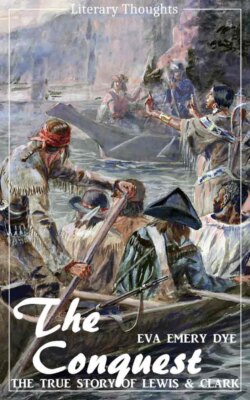Читать книгу The Conquest: The True Story of Lewis and Clark (Eva Emery Dye) - illustrated - (Literary Thoughts Edition) - Eva Emery Dye - Страница 16
На сайте Литреса книга снята с продажи.
Chapter XI – A PRISONER OF WAR
Оглавление"A prisoner of war? No, indeed, he is a felon, a murderer!" exclaimed the Virginians, as weary, wet, and hungry the late Governor of Detroit sat on his horse in the rain at the door of the governor's palace at Williamsburg, where Jefferson now resided. The mob gathered to execrate the "hair-buyer general" and escort him to jail.
There were twenty-seven prisoners, altogether, brought by a band of borderers, most of the way on foot.
Every step of the long journey Captain John Rogers and his men had guarded the "hair-buyer general" from the imprecations of an outraged people.
It was the first news of Vincennes, as the startled cry ran,—
"Governor Hamilton, charged with having incited Indians to scalp, torture, and burn, is at the door,—Hamilton, who gave standing rewards for scalps but none for prisoners; and Dejean, Chief Justice of Detroit, the merciless keeper of its jails, a terror to captives with threats of giving them over to savages to be burnt alive; Lamothe, a captain of volunteer scalping parties; Major Hay, one of Hamilton's chief officers, and others."
"Load them with heavy fetters and immure them in a dungeon," said Governor Jefferson. "Too many of our boys are rotting in British prison ships." This from Jefferson, so long the humane friend of Burgoyne's surrendered troops now quartered at Charlottesville!
The British commanders blustered and protested, but Jefferson firmly replied, "I avow my purpose to repay cruelty, hangings, and close confinement. It is my duty to treat Hamilton and his officers with severity. Iron will be retaliated with iron, prison ships by prison ships, and like by like in general."
Washington advised a mitigation of the extreme severity, but Jefferson's course had its effect. The British were more merciful thereafter.
And with the coming of Hamilton came all the wonderful story of the capture of Vincennes. And who can tell it? Who has told it? Historians hesitate. Romancers shrink from the task. Not one has surpassed George Rogers Clark's own letters, which read like fragments of the gospel of liberty.
Before the home fire at Caroline, John Rogers told the tale. A hush fell. The mother softly wept as she thought of her scattered boys, one in the west, two with Washington tracking the snows of Valley Forge, one immured in a prison ship where patriot martyrs groaned their lives away.
Little William heard the tale, and his young heart swelled with emotion. John Clark listened, then spoke but one sentence.
"If I had as many more sons I would give them all to my country."
All the way from Kentucky Daniel Boone was sent to the Virginia legislature. He said to Jefferson: "I doubt these charges against Governor Hamilton. Last Spring I was captured by the Shawnees and dragged to Detroit. Governor Hamilton took pity on me and offered the Indians one hundred dollars for my release. They refused to take it. But he gave me a horse, and on that horse I eventually made my escape."
"Did that prevent Governor Hamilton from sending an armed force of British and Indians to besiege Boonsboro?" inquired Jefferson.
Boone had to admit that it did not. But for that timely escape and warning Boonsboro would have fallen.
But Boone in gratitude went to the dungeon and offered what consolation he could to the imprisoned Governor.
The fact is, that Daniel Boone carried ever on his breast, wrapped in a piece of buckskin, that old commission of Lord Dunmore's. It saved him from the Indians; it won Hamilton.
